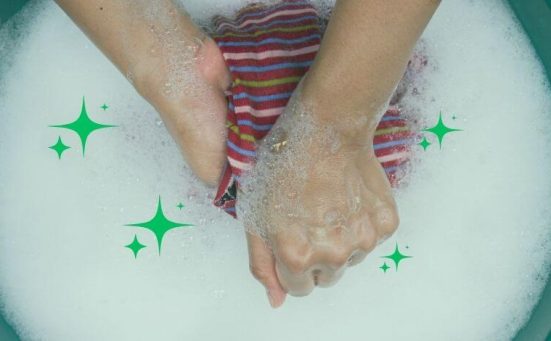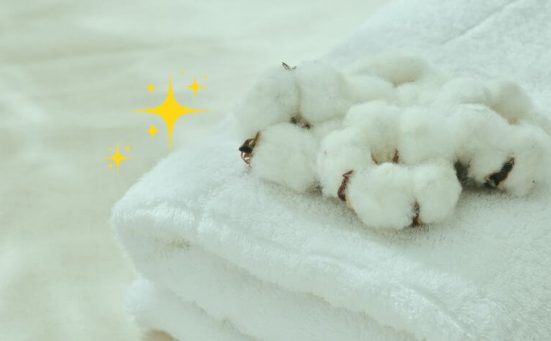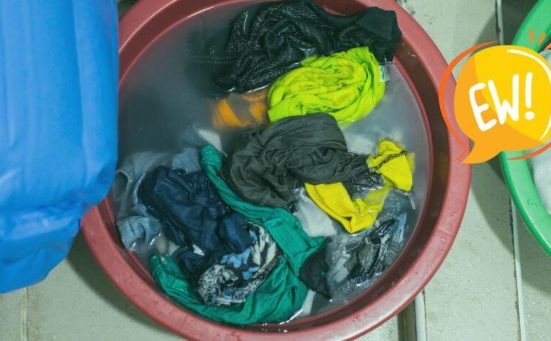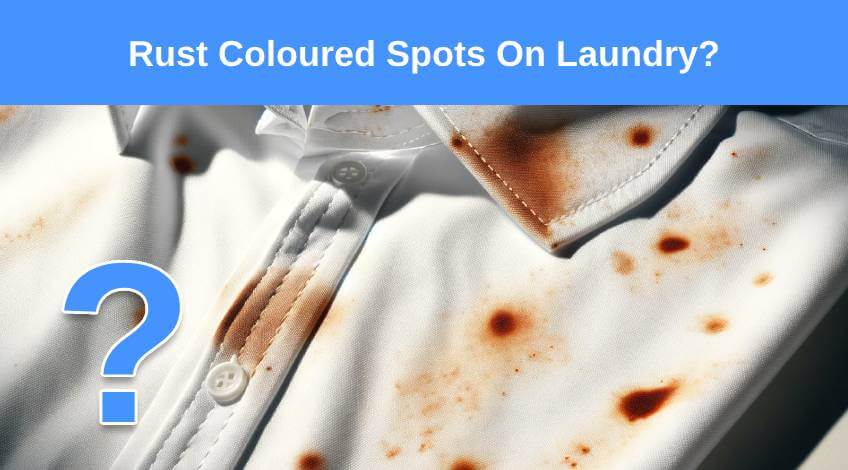
Rust Coloured Spots On Laundry? (here’s why & what to do)
You just finished doing your fresh batch of laundry, only to find that your clothes now have rust-coloured stains. Why did this happen?
There are several reasons why your clothes may have orangey-brown spots after being in the wash. The most common causes are forgotten metal objects, using water that has a high iron content, dirty plumbing or washer parts, or your clothes being in contact with rusty surfaces or objects.
In this article, we’ll let you know the exact reason behind the spots, what you can do to prevent this issue in the future, and how to remove the stains from your fabrics.
Why Are There Orange Or Brown Spots On Your Clothing?
Rust stains are not just annoying – but they can also make your clothes look old and dirty. Where did they come from? Let’s go into detail:
Forgotten Metal Objects
Have you ever left a coin, paper clip, or maybe your keys in your pocket and thrown that item straight in the wash? Unfortunately, these metal objects can rust during the wash cycle, leaving behind those nasty marks on your fabrics.
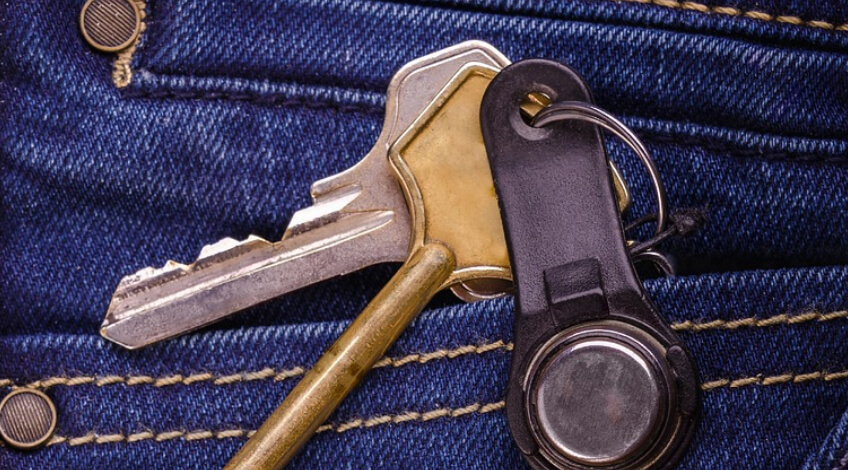
To prevent this from happening, make sure to always check each item of clothing before putting it in the washing machine. Make sure to empty the pockets and remove any item, even paper towels, as they can cling to your fabric and cause white dusty stains.
Iron From The Water Supply
Do you live in an area that uses hard water? If this is the case, the culprit could be the high iron content from your water. Hard water contains a lot of minerals, such as calcium, magnesium, and yes, iron, which may be causing the orange or brown stains on your garments.
TIP: How do you know if you’re using hard water? You can use this site to check. Having white stains on your kettle or dishes is also a clear sign of limescale.
To prevent this from happening, it may be a good idea to invest in a laundry product that has water-softening properties. The most popular choices are water softener tablets or even white vinegar as an alternative.
- LIMESCALE SMACKDOWN -Stops limescale buildup in its tracks, extending the life of your machine.
- ODOR KNOCKOUT -Neutralizes unpleasant smells for fresh-smelling laundry.
If your budget allows, you may also want to look into a soft water system, as it could be a good investment, especially for those of us living in the UK!
SEE ALSO: 24 Reasons To Buy A Water Softener
Dirty Pump Filter
The pump filter in your washing machine is designed to catch small items and debris from the water before they get in the wash cycle. Over time, this filter can become clogged with various materials, including rust from the water or from the rusty parts in the washing machine.
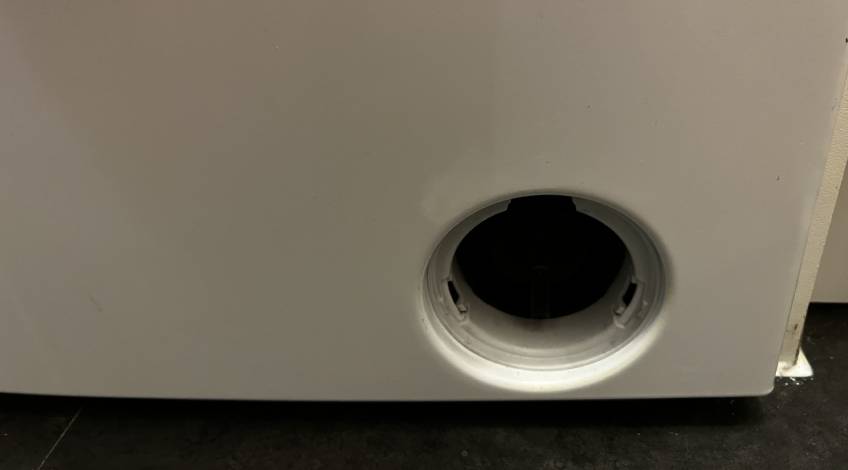
Once there’s rust in the pump filter, it will also make its way into your clothing, which is the reason behind the mysterious brown or orange stains.
To prevent this from happening, it’s important to regularly clean the pump filter according to the washing machine manufacturer’s instructions. Make sure to read the appliance’s user manual first before attempting to clean the filter to prevent further damage.
Rusty Parts In The Washing Machine
Sadly, one of the reasons behind the rust-coloured stains on your clothes may be caused by the washing machine itself. Over time, the washer will have signs of wear and tear, particularly on its metal parts. When this happens, rust may start to form, and when it dislodges, will make its way to your fabrics.
To prevent this from happening, check your washer for faulty or rusty parts. This can be a rusty drum or corroded pipes or hoses, that may be fixed by applying a rust remover inside the drum or by replacing the old pipes or hoses.
Make sure to contact a professional technician if you’re unsure of how to deal with the issue.
Rusty Surfaces Or Objects
Although you may not have noticed when putting your clothes in the wash, there’s always the possibility that they are already stained before you start the laundry cycle.
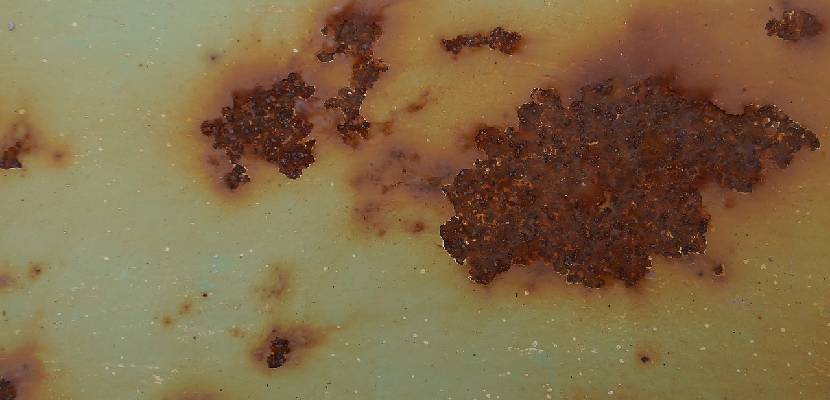
It could be from a rusty hanger or hook, a table with rusty parts, or other corroding fixtures that may have come in contact with your fabrics.
To prevent this from happening, always check your clothes for stains before laundering them. Why? Because you’ll have a better chance of removing them with the right pre-treatment method.
Rusty Pipes Or Plumbing System
If you have an older plumbing system, there’s also the possibility that rusty pipes may be causing the staining problem. When the water goes through the corroding pipes, it will also include some of the rust on its surfaces, which will then make their way into your clothes.
To prevent this from happening, you may have to call a professional plumber to handle the rusty system. Tinkering with them on your own can be dangerous, and you could end up having to spend more on repairs.
How To Remove Rust Stains From Clothing
Getting rid of rust-coloured stains can be difficult, but not impossible. With your patience in one arm, and laundry products in another, here’s what you need to do.
You Will Need
- A soft-bristled brush (an old toothbrush will do)
- Cold water
- White vinegar
- Basin
- Mild laundry detergent
- Stain or rust remover product
- Bicarbonate of soda (optional)
Gently Scrub The Stained Areas
Using a soft-bristled brush, gently scrub the stained areas to remove excess stains. There may still be clumps of rust on the fabric that can easily be dusted off to prevent the stain from setting further into the fabric.
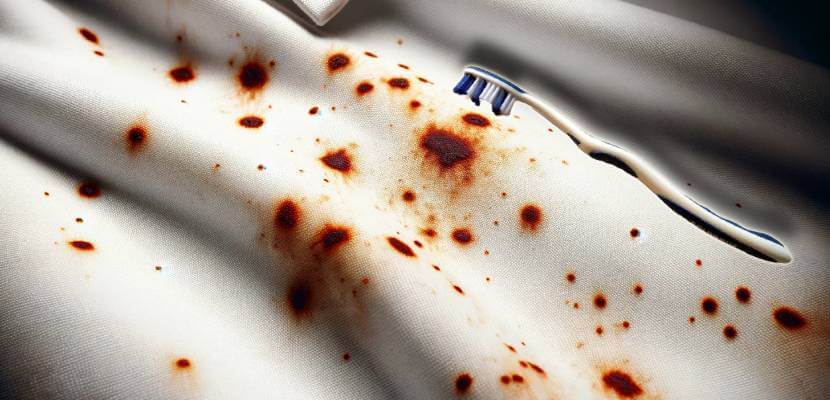
Run Stains Under Cold Water
Reduce the stain’s viscosity by rinsing the stained areas under cold running water. The higher the pressure is, the looser the rust particles will be, making them easier to remove. Make sure to rinse from the back of the stain to push the rust out of the fabric.
Soak The Garment
If the stain is too stubborn, it’s best to soak your garment in a basin with a solution of one part white vinegar to two parts water. Let it soak for at least 30 minutes, and for tougher spots, allow the garment to stay in the solution for at least 3 hours.
TIP: Always check the care label of your fabric as some may be too delicate to soak for more than 30 minutes.
Apply Pre-Treatment
After soaking, squeeze the excess moisture and apply your preferred stain or rust remover to the stained area. Make sure to follow the instructions on the packaging for best results, as each product often contains special directions to make the stain lift easier. You can also use your laundry detergent for pre-treatment!
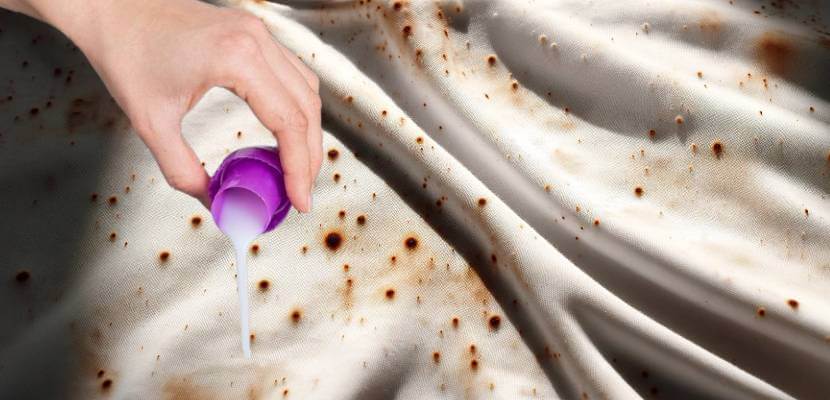
If you want a natural alternative or use fewer chemicals, bicarbonate of soda can also be used as a stain remover. Just sprinkle enough to cover the marks, then scrub gently with a soft-bristled brush. Let it sit for at least an hour (or overnight for stubborn stains), then wash with cold water.
Repeat if necessary.
WARNING: Avoid bleach for rust stains. The materials in bleach can just oxidise the iron, which will make spots more difficult to remove.
Wash As Normal
Once pre-treatment is done, you can now wash your clothing as normal. Add a mild detergent and wash the stained garment separately. After all, you wouldn’t want unnoticed stain residue to transfer to other clothing, which would just be a waste of time and resources.
Air Dry
Once washed, check the stained area before drying. If the stain still remains, repeat the treatment process. If the stain is gone, air dry the garment by laying it flat or hanging it up to dry.
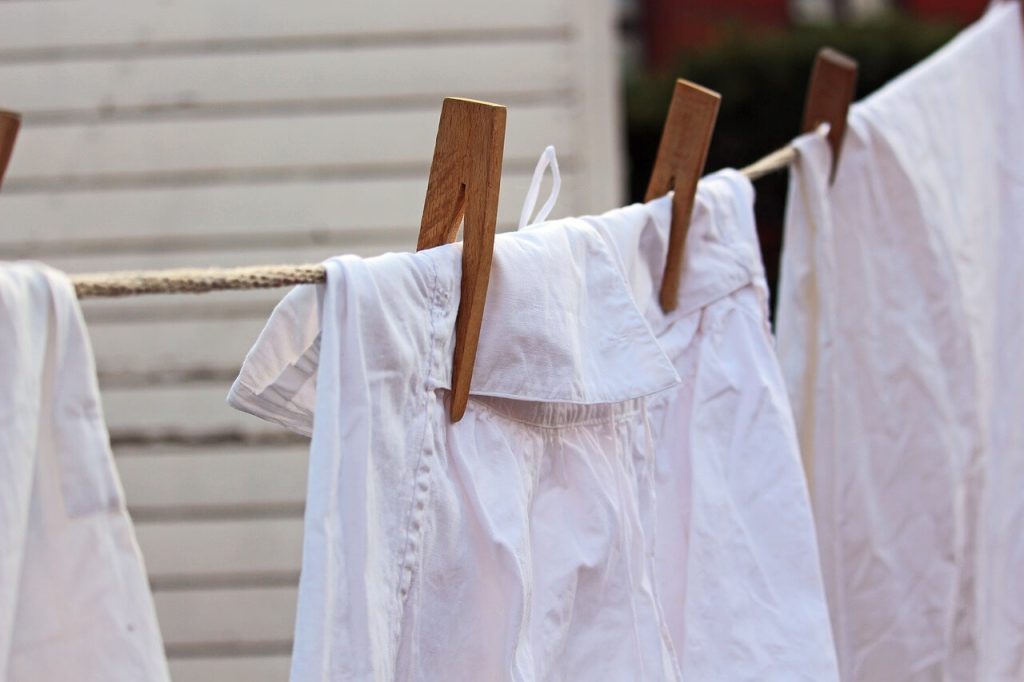
WARNING: Never tumble-dry stained clothing until you’re sure it’s completely removed. The heat in the machine will just set the stains, making them more difficult to remove, or worse, permanent.
Making Your Clothes Rust-Free
Rust stains can be challenging to deal with, but with the right approach, you can definitely remove them for good.
As always, prevention is better than cure. Make sure to keep an eye on your washer for any signs of rust, and consider using a water softener if you have hard water.
Do you have questions? Ask away!
Frequently Asked Questions
The most common causes of rust-coloured stains on clothes are forgotten metal objects in pockets, a high iron content in the water supply, a dirty pump filter, rusty parts inside the washing machine itself, contact with rusty surfaces or objects before washing, or rusty pipes in the plumbing system.
Your washing machine may be leaving rust marks on your clothes if its pump filter is clogged with debris and rust, if it contains rusty parts like a corroded drum or pipes, or if the water going through it contains a high amount of iron from old pipes in the plumbing system.
To remove rust stains from clothes, gently scrub the stained areas, rinse with cold water, soak the clothes in a white vinegar solution, apply a rust remover or stain pre-treatment, avoid using bleach, wash the stained clothes separately with a mild detergent, and air dry the clothing completely instead of tumble drying to prevent setting the stains. Repeating the process may be necessary for stubborn stains.
Also, follow us on Pinterest ...


